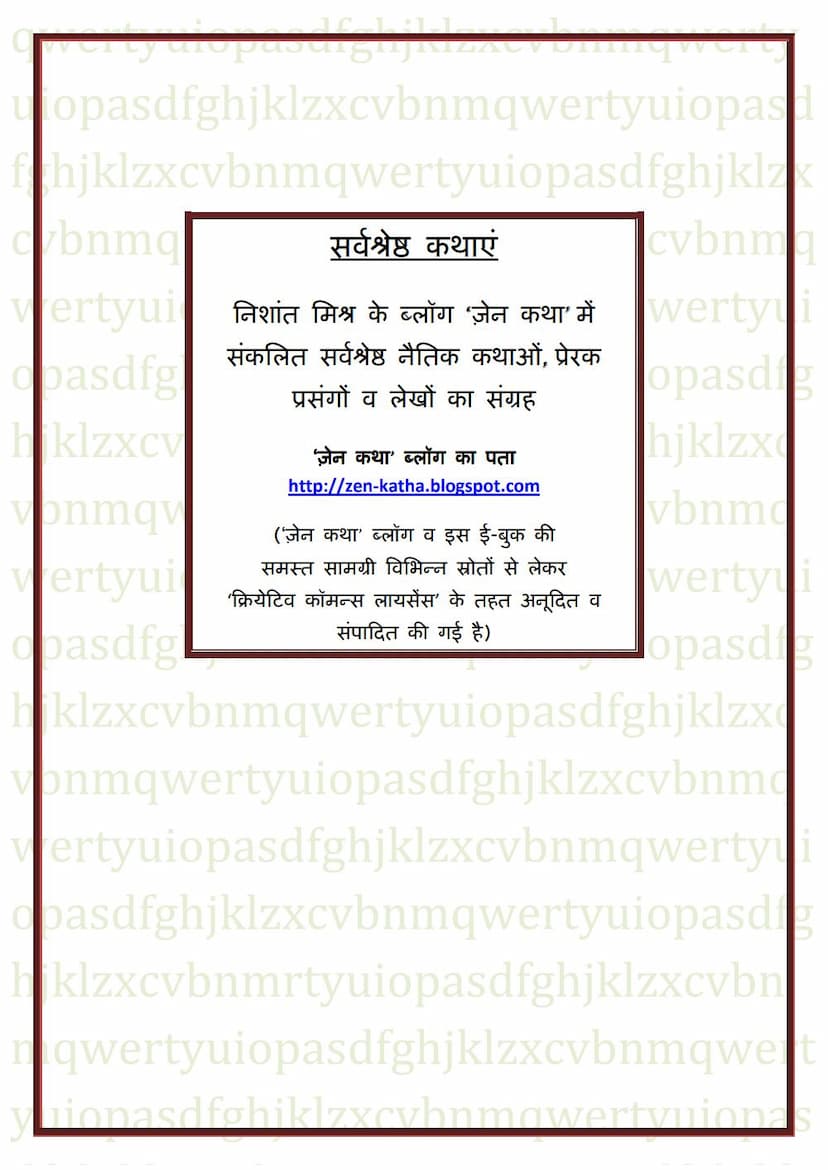Zen Katha
Added to library: September 2, 2025

Summary
Here's a comprehensive summary of the Jain text "Zen Katha" by Nishant Mishra, based on the provided pages:
Book Title: Zen Katha (Stories of Wisdom) Author: Nishant Mishra Publisher: Nishant Mishra Content Overview: "Zen Katha" is a compilation of ethical stories, inspirational anecdotes, and articles from Nishant Mishra's blog of the same name, hosted on http://zen-katha.blogspot.com. The e-book is presented as a collection of "best stories" and aims to offer moral guidance and motivation.
Key Themes and Content:
- Moral and Ethical Stories: The e-book is primarily composed of short, impactful stories that convey moral lessons. These stories often draw from Zen Buddhist philosophy, Taoism, and other wisdom traditions.
- Inspirational Anecdotes: The text features numerous short narratives illustrating principles of life, such as the importance of hard work, control over anger, humility, the nature of true miracles, and the power of perspective.
- Wisdom from Various Traditions: While the title suggests a Zen focus, the stories are drawn from a diverse range of sources, including Taoist tales (like the story of the farmer and the horse), Buddhist teachings (like the Buddha statue being imprisoned), and anecdotes attributed to figures like Socrates, Lao Tzu, Chuang Tzu, and various Zen masters (e.g., Hakuin, Nan-in, Ryochan). There are also stories with a more general ethical or philosophical bent.
- Focus on Inner Qualities: Many stories emphasize the cultivation of inner virtues, such as patience, self-control, detachment from material possessions, kindness, and the understanding of true happiness.
- Simplicity and Mindfulness: The concept of living a simple, mindful life is a recurring theme. Stories like "The Tea Cup" and the one about the Zen master's simple miracles highlight the importance of an uncluttered mind and present-moment awareness.
- The Nature of Reality and Perception: Several stories explore how our perception shapes our reality. The story of the blind man and the sculptor, or the parable of the "House and the Mountain," illustrates how changing our perspective can solve problems.
- Personal Growth and Learning: Many narratives serve as cautionary tales or offer advice on navigating life's challenges, emphasizing that mistakes are learning opportunities. The advice from Leo Babauta in the later pages is a direct example of this.
- Author's Introduction: Nishant Mishra started the blog in October 2008, recognizing the potential of Hindi blogging. He states that the e-book compiles content published up to April 25, 2009, and encourages readers to visit the blog for the latest material. He also notes that the content is translated and edited under a Creative Commons license, with no copyright intended, and that proper attribution is given where sources were specifically mentioned.
- Dedication: The e-book is dedicated to the author's two children, Anahita and Aayaan.
- Structure: The e-book is presented as unorganized, allowing readers to pick it up from any page. No table of contents is provided for this reason.
Examples of Stories and Their Lessons:
- Hard Work: A student asks a Zen master how long it will take to master martial arts. The master says 10 years. When the student offers to work harder, the master replies 20 years, implying that eagerness without patience can hinder progress.
- True Miracle: A scholar challenges a Zen master, boasting of his guru's supernatural powers. The master's miracle is simply eating when hungry and drinking when thirsty, representing the purity of Zen practice.
- The Temple of Silence: A Zen master teaches his disciples through silence, stopping chants and scripture study. The neighbor recognizes the master's passing by the return of sound to the temple.
- Is That So?: A Zen master calmly accepts blame for a child's parentage without protest, demonstrating profound equanimity and non-attachment to reputation. When the truth is revealed, his simple "Is that so?" signifies acceptance.
- The Tea Cup: A Zen master stops pouring tea into an already full cup, explaining to a professor that his mind, filled with his own ideas, cannot receive new wisdom.
- The Tao Story (The Farmer's Horse): A farmer faces various events (losing a horse, gaining wild horses, his son breaking a leg, his son being spared military service) with the consistent reply, "Yes... maybe." This highlights the uncertainty and interconnectedness of events.
- The Traveler and the Wall: Two travelers lost in a desert find a wall with sounds of water and birds. One climbs over and disappears. The other returns to guide others, showing different approaches to finding solutions.
- The Little Fish: A story about a fisherman teaching his son the art of fishing, emphasizing balance and understanding the pull of the world.
- The Useless Tree: Chuang Tzu explains to a man that his seemingly "useless" tree is valuable because it remains standing, unlike useful trees that are cut down. This speaks to the advantage of not being conventionally "useful."
- The Wooden Box: An old farmer's son attempts to discard him, but the father's simple request to save the burial box for the son's children teaches a profound lesson about the cycle of life and responsibility.
- Four Wives: A wealthy merchant's story comparing his four wives to his body, wealth, family, and soul, illustrating that only the soul (the neglected first wife) truly accompanies one in death.
Author's Intent: Mishra aims to share these valuable lessons in a readily accessible format, hoping to inspire readers and contribute to their personal and spiritual growth. The e-book emphasizes the value of introspection, understanding life's complexities, and living a virtuous life.